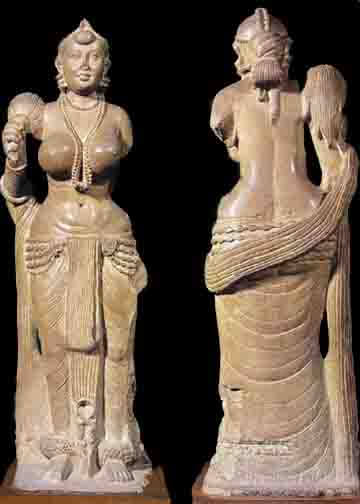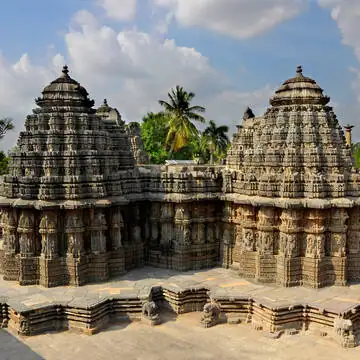Differences between Buddhism and Jainism
- Avoidance of extremities of penance and enjoyment is propagated by Jainism to attain salvation while Buddhism advised its Upasakas to follow the middle path or Tathagata marg.
- Ahimsa : Though both emphasise the principle of Ahimsa, yet Jainism is more strict in this connection.
- Soul: Buddhists do not believe in the existence of soul whereas Jainism believes the existence of soul in every living being.
- Regarding Conduct: Buddhism emphasises the eightfold path whereas Jainism emphasises Tri Ratna.

| Buddhism | Jainism |
| The idea of an omniscient, omnipotent, omnipresent creator is rejected by Buddhists. The Buddha himself refuted the theistic argument that the universe was created by a self-conscious, personal God. | Jainism does not believe in a Creator God. |
| Rebirth is one of the principal beliefs in Buddhism. It is thought that the endless cycle of birth and re-birth can only be broken by attaining Nirvana (Enlightenment) | Jainism believes that the circle of rebirths and deaths will continue due to good or bad deeds until liberation is achieved |
| Scriptures include Tripitaka, which is a vast text consisting of 3 sections: the Discipline, the Discourse and the Commentaries. | Jain religious texts are called Agamas |
| The principal teaching of Buddhism is that life is suffering and to escape suffering (end cause of desire) one needs to dispel ignorance by realizing the Four Noble Truths and practising the Eightfold Path | Jainism lays emphasis on the respect of all living beings. Liberation from the cycle of rebirths is attained by taking the Five Vows and following the principles of the Three Jewels |
| Sin is not a concept in Buddhism | Sin is defined as harm to others |
| Buddhism is divided into two major sects upon the death of Gautama Buddha. They are the Mahayana and the Theravada | Svetambara and Digambara are the two major sects of Jainism |
| According to some texts in Buddhism, there are beings in heaven but they are bound by “samsara”. They suffer less but they have, not yet achieved salvation | Deities in Jainism are known as “Titrtheneakas”. But they are not worshipped in the conventional sense as they are regarded as wise teachers whose teachings must be followed |
| Buddhism was founded in modern-day Nepal by Prince Siddhartha in the 6th century B.C | Scholars of religion generally hold that Jainism originated in the 7th–5th century BC in Northern India. Mahavira, also known as Vardhamana was the 24th Tirthankara (Spiritual Teacher) of Jainism |
| Followers of Buddhism can be found mainly in Thailand, Cambodia, Sri Lanka, India, Nepal, Bhutan, Tibet, Japan, Myanmar (Burma), Laos, Vietnam, China, Mongolia, Korea, Singapore, Hong Kong and Taiwan | Followers of Jainism are found mainly in India, lower Asian subcontinent throughout, and America. Small groups exist in most countries |
Similarities between Buddhism and Jainism
- Both deny the existence of God.
- Both denied the authority of the Vedas and the necessity of performing sacrifices and rituals.
- Both taught in the language of the common people i.e. Prakrit and not in Sanskrit which was the language of the priests.
- Both of them were opposed to animal sacrifices.
- Both of them admitted disciples from all the castes and from both sexes.
- Ahimsa is the prominent principle of both the religions.
- Both Buddhism and Jainism put stress on right conduct and right knowledge and not on religious ceremonial and ritual as the way to obtain salvation.
| Factors | Explanation |
| Rejection of Vedas | Buddhism and Jainism rejected the notion of grand rituals along with the authority of the Vedas and the priestly class |
| Founders | Just like his contemporary, Gautama Buddha, Mahavir Jain was born into a royal family. Both of them renounced their comfortable lifestyle to attain enlightenment |
| Animal Rights | Both Buddhism and Jainism also stressed the principle of non-violence against animals and they must also be given equal respect as one gives to a fellow human being |
| Karma | Both Buddhism and Jainism believe in the concept of karma, which is an attachment of positive and negative forces to the soul based on a person’s actions, beliefs, and spiritual attachments. Reincarnation carries this force forward and requires effort to purify the soul. |
| God and Scripture | Neither religion believes in God as the creator of the universe. They acknowledge all creation as being part of the universe’s divinity. As such, their holy texts are not considered the word of a god or sacred stories. |
| Reincarnation | Buddhism and Jainism believe in the concept of reincarnation, which is the rebirth of the soul in a new body after the death of the previous body. |
Also refer :








